Maerdy: Sky's the limit for new generation
- Published
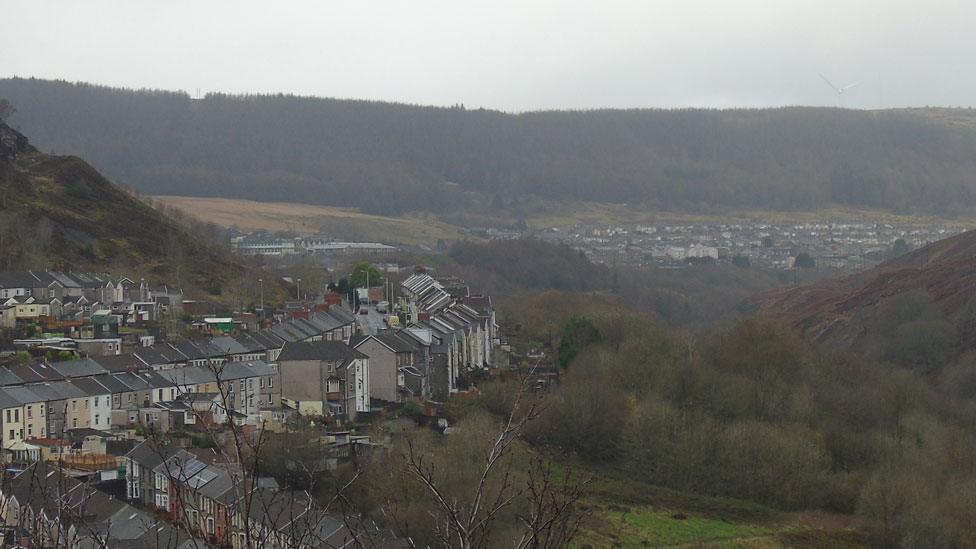
Maerdy in the distance, with Ferndale in the foreground
The mine may have now been gone for 25 years but what are the hopes for the next generation in Maerdy?
The community spirit is strong and despite some economic problems there are some other encouraging signs:
The village has a school on its doorstep which has turned around performances of its pupils
New owners have turned around the fortunes of a factory on the site of the old colliery to export to China
We can reveal hopes of a new tourism attraction which could see people travelling to Maerdy to see stars.
THE NEXT GENERATION
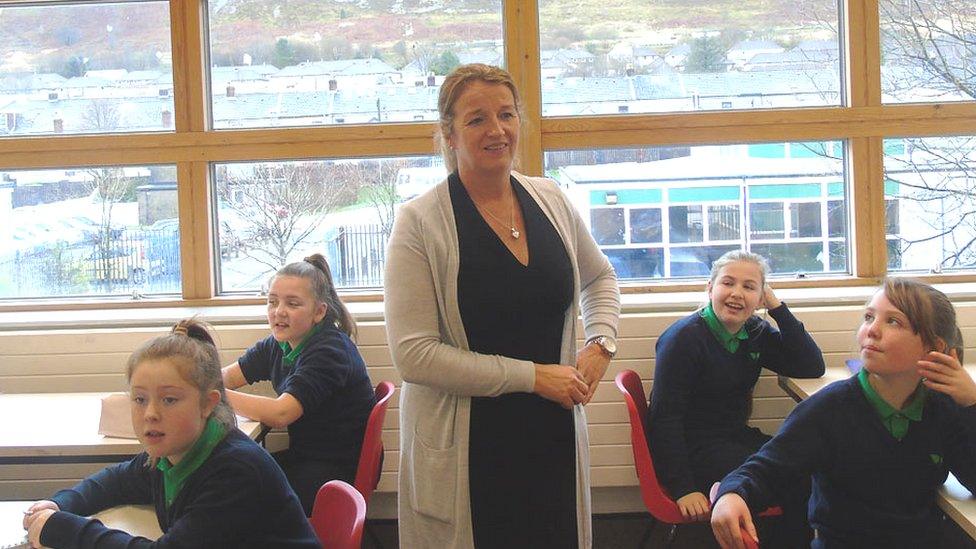
Head Heather Nicholas
Ferndale Community School is just inside the Maerdy village boundary on the road up the valley. Some locals still call it "Maerdy Comp." After some difficult years, it has been showing remarkable progress.
Two years ago it became the only school in Wales to jump from a Band 5 to a Band 1 in a single year in the Welsh government's performance rankings. It has now been picked as one of the pioneering schools to develop Wales' new national curriculum.
Three years ago, barely a quarter of teenagers left school with the benchmark qualifications - at least five A* to C grades at GCSE, including English and Maths.
But last summer, 52% of pupils at Ferndale Community School earned these top grades - not far behind the Wales average of 57.9%.

Even more striking is the progress among children from poorer backgrounds.
More than a third of Ferndale's 650 pupils qualify for free school meals.
At a low point five years ago, only 2.3% from this group left school with five good grades, which the school admits was a "shocking" figure.
Last summer, 37% got five *A-C from the free school meals category - better than both the Wales and local council averages.
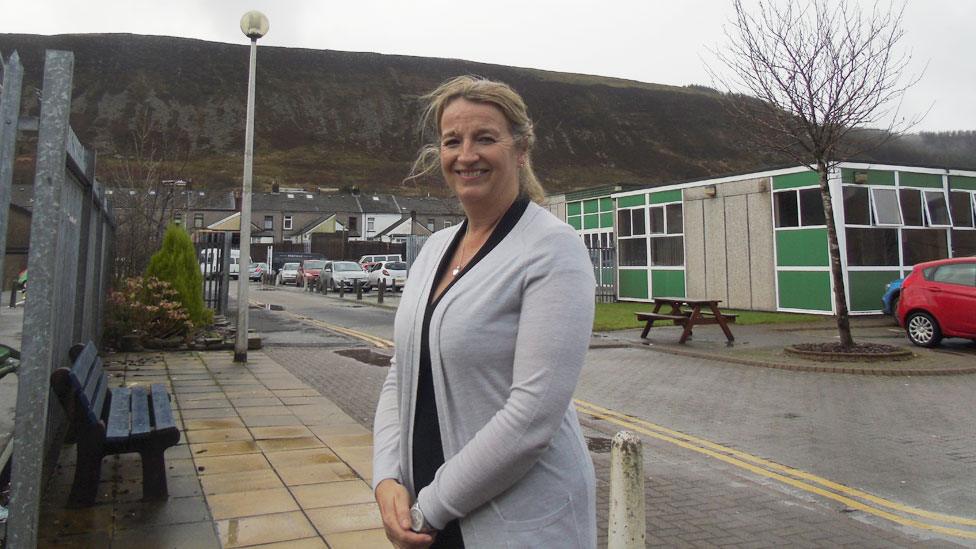
What's behind the turnaround?
New head teacher Heather Nicholas arrived in May 2011 after a poor inspection and with the school in danger of being placed in special measures if the decline wasn't reversed.
There was a vicious circle of poor performance and unhappy pupils not wanting to be in classes.
"The school was rated at the bottom of any and every kind of table that exists - poor attendance, poor attainment," said Mrs Nicholas.
"The behaviour wasn't good and conducive to learning. There was a heavy focus on a few, very troubling students and there was less time for the vast majority."
She said the staff felt passionate about the school and were ready for change.
"There was a lot of anger and agitation amongst staff and pupils; we looked at making the biggest impact," she added.
Bad behaviour was tackled by a standard disciplinary warning system for each class.
It meant exclusions were high but it looked to end disruption for those who wanted to learn. A "more business-like" school uniform of shirts and ties for older pupils was also brought in, to encourage maturity.
'Blanket approach'
"There was a tendency in the school to try to be everything; what we're clear about is we're excellent teachers, we're not great social workers, police officers or community workers," said Mrs Nicholas.
"All of these roles we were doing badly, really. We focus on our jobs but strengthen our links with the specialists outside schools - youth workers, community police and drug awareness teams.
"We don't try to do it all ourselves or punish the child for having the problem."
The school has worked hard on literacy and communication skills, giving pupils more confidence to express themselves. An extra English teacher has been employed. In Maths, where pupils struggle with specifics - like fractions - all years come together for special focused sessions.
Attendance - at 86% one of the lowest in south Wales - has also improved to nearly 93%.
As well as 36% qualifying for free school meals, the school estimates another 38% of pupils also have poverty issues.
The school steps in to try "to play the role of the middle class parent" and fill in the gaps but takes a "blanket approach".
"There's a danger of thinking everyone on free school meals has feckless parents; they don't," said Mrs Nicholas.
"There are a lot of things we've done for the whole school because families are very adept at hiding [poverty], they're proud. Although 20% don't need us to, we buy all Year 7 a uniform to start with - every single one of them."
The school sources funding so every pupil has an experience during their time of a residential trip with friends away from the valley.
For the bigger trips - which have included skiing and a trip to Hollywood for 130 pupils - pupils raise funds and earn time credits to pay for them.
"It's confidence," Mrs Nicholas explained. "We want them to get all the experiences we can so they can hold their own.
"We've a proportion of children who've never seen the sea - I want children here to have the things that my daughter had."
The school takes a sensitive and personal approach for dealing with poverty issues as they affect individuals.
Punctuality can still be an issue with some pupils having to get themselves up for school. But pupils have set up a texting system to wake each other up.
"We've also got a washing machine and tumble dryers on the go all the time," she added.
"We have conversations with children, without offending them, that 'mum and dad are great but they aren't ever going to be good at laundry are they?' We persuade the children to look after it themselves.
"We want to get to a place where we can treat all the children the same. It's hard to tell off a child for not doing their homework when you know they're in darkness in the winter nights because there's no electricity.
"We provide homework facilities here, at Maerdy library and in Penrhys. So now we can say, you may not have electricity however you should have used those [facilities]."
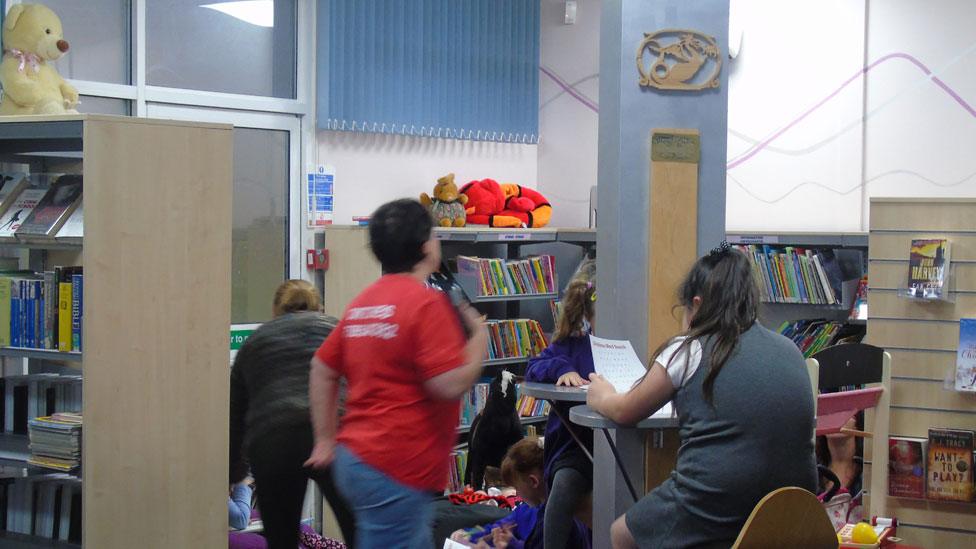
The re-opened Maerdy Library is offering homework and after-school facilities
Mrs Nicholas - who received a Welsh inspirational teacher award last year - said she was confident the new generation can fulfil their potential.
Students are looking for work in the civil service, teaching and in legal firms.
Now she wants to encourage more engineers and entrepreneurs and is looking to forge links with the University of South Wales aeronautics department.
"The mine's never coming back, neither is the railway line. You don't want to negate history but it's looking forward rather than wishing backwards.
"With this generation coming through they're ready for that. The number of boarded up buildings is depressing. We're working with the council to stop the library being another boarded up building - there's the line, let's move forward."
"It's not all negative living here - the traffic and house prices - Cardiff is just 35-45 minutes down the road, you can still live here and work there.
"Our goal is that a child can leave here and walk into any job interview and say, 'stay out of the way Cardiff High School students, that job's mine'.
"For the first time we've had Oxbridge applicants, they had interviews. They didn't get in this time but we rejoiced that our children felt they could sit at that table.
"Not that local universities aren't fantastic but now many of our students are going further afield, Manchester, Bristol, Birmingham - it's great."
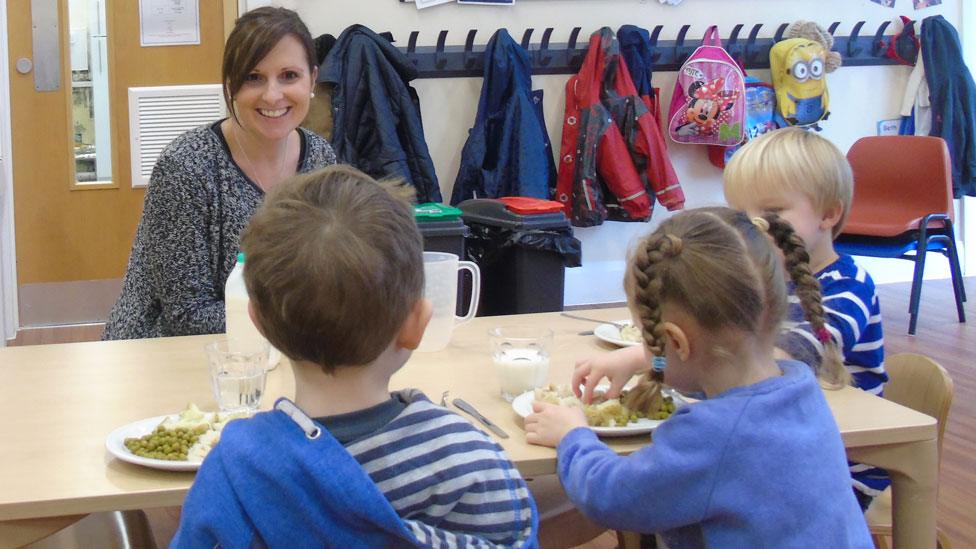
Nikki Beach in the community creche on the site of Ferndale School
Mrs Nicholas says her long term hope is that the school will offer a facility for the weekends and holidays too, where there is a need.
Already there is something of a hub in an old school building in the grounds.
A youth club runs after school and also on some evenings. A minibus picks up teenagers in surrounding villages to take them to the valley sports centre for football.
The school site also has a crèche, operated by the Friends of Ferndale charity with funding from the Welsh government-backed Flying Start initiative.
The plan is for training and classes to be put in place for mothers, with free childcare for 2.5 hours, five days a week for 20 children. It operates all day and mothers can pay a top-up if they need it for longer.
Nikki Beach, project manager, said after removing the cost of childcare as a barrier, rather than just putting on off-the-shelf courses they were listening to what sort of training mothers actually wanted.
"People need a little support and encouragement," she said.
Councillor Keiron Montague said with the skills and aspirations, people can do anything.
"A child in Maerdy is going to get the same opportunity in education than a child in any other area - if not more, because the actual provision is so good.
"And I think they have the aspirations - they're the same as the children I've met in Cardiff, Barry and mid Wales.
"Just because an area is classed as deprived doesn't mean that the family infrastructure isn't solid and sound. They might not have the money but they have the time and effort and work with their children as well.
"Some struggle with that, like any area, but you go up to the community hub there are parents volunteering, working with their children on drama, arts, dance projects, IT projects. It's not just what goes on in the school, it's after school too."
SNAPSHOT OF THE FUTURE
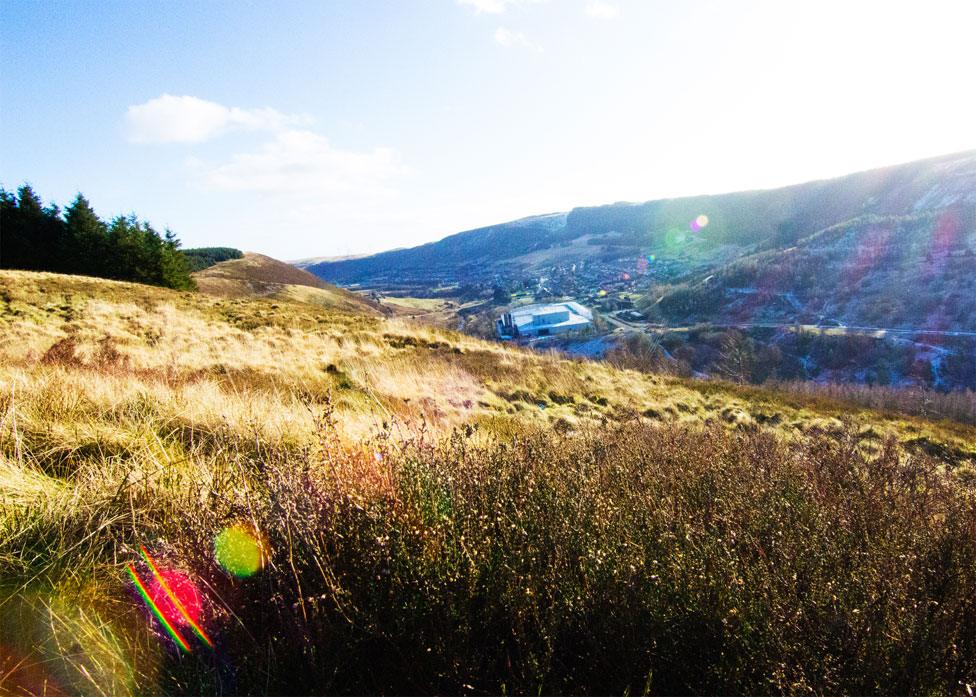
Aberdare mountain looking down towards Maerdy

Jess Richards has set up a photography business from home

Jess covers local organisations and events

'It's a special community' says Jess

Maerdy Fun Day
Jess Richards, 21, is a film and photography graduate - and ex-Ferndale Community School student - who has set up her own business in the village with the help of a community wind farm grant.
She covers weddings and local events and said she hopes to document Maerdy on film as it develops in the future.
"We've got a pub and a couple of clubs but there's not a lot for young people to do at the moment and the skate park in Ferndale closed recently so we need something like that," she said.
"I'd like to see more shops and local businesses too.
"It's important to me to stay in Maerdy, it's my home village and I feel proud to be from here.
"It's also near some beautiful countryside, so we need more things to do with nature - for instance, there's a good project they're setting up with local woodlands."
FROM COAL TO RUBBER
Archive of the official opening of Fenner's in Maerdy in 1997
Where the old colliery's pithead once stood is now a factory car park.
After Mardy's closure in 1990, the land was reclaimed and with great fanfare - and some controversy - a new £25m plant opened in 1997, making rubber parts for cars.
Money from the old Welsh Development Agency and Welsh Office was enough to beat off competition from France and Ireland. Fenner's Polymers moved work from Hull, Peterborough and further down the Rhondda to Maerdy.
It promised 500 jobs but within three years turnover had dropped to £6m and the next few years is a story of takeovers, administrations and a slimmed-down workforce.
In hindsight, the feeling is the owners were trying to do too much, too soon and the quality wasn't always there.
Avon Engineered Rubber took on the challenge in 2007, with just 84 workers left.
So the factory wouldn't be vulnerable to fluctuations in demand in the car industry, the new owners diversified.
As well as making rubber hoses for the likes of Aston Martin, Land Rover and Nissan, the key to keeping Maerdy's factory open and thriving is tiny - a seal for aerosol spray cans and bottles.
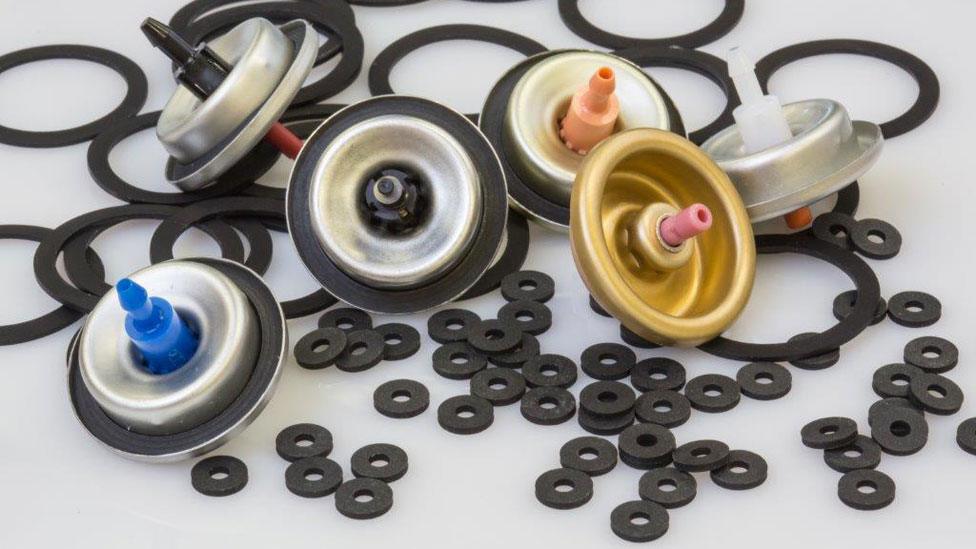
A tiny gasket used in millions of aerosol cans and bottles - pictured front - has helped save the Maerdy factory
Avon can make up to 24 million of them - a day. They're being exported to five continents and supply brands ranging from Lynx to Chanel.
On a tour, Kevin Harrop, manufacturing and operations director, admits when they took over the factory was in danger of going under.
The company got back to basics.
"It was about getting housekeeping right, cutting waste and in a nutshell during the first 18 months we turned the plant into profit and invested it back into new equipment," says Mr Harrop.
The aerosol gaskets have been a lifeline and now an important driver of the business.
"It means all our eggs aren't in one basket. It paid dividends in 2008 when the recession came and automotive crashed and we could maintain our turnover through aerosol and ensure we're still here today.
"The engineering which goes into the gaskets is second to none. The precision has to be fundamentally correct but we've also been driving the amount of waste down to ensure we're competitive in a world market place."
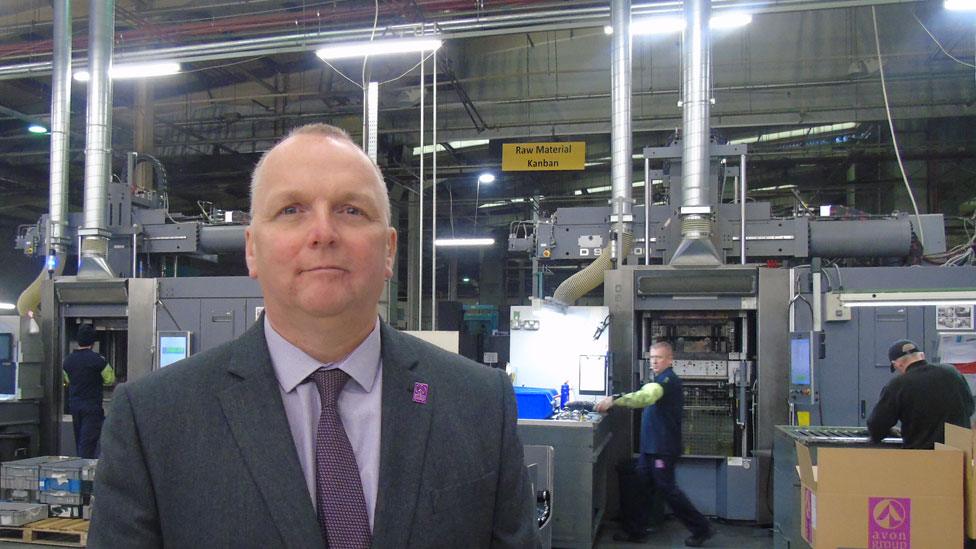
Kevin Harrop has to look at efficiencies to stay competitive
The company has its own chemists and a development lab to ensure the product is perfect.
"If you buy a bottle of Chanel - you expect to spray Chanel and get the perfume scent everyone recognises," said Mr Harrop. "If we start changing the formulas within the compound we use - and start using different ingredients - the compounds will look the same, smell the same but they can react differently with the perfume in the bottle and when you spray it - the perfume it could be horrendous.
"The tolerances on dimensions of the gasket are 2000th of an inch - 15 years ago I'd have said it was nonsense to be able do that but that's what we're able to do."
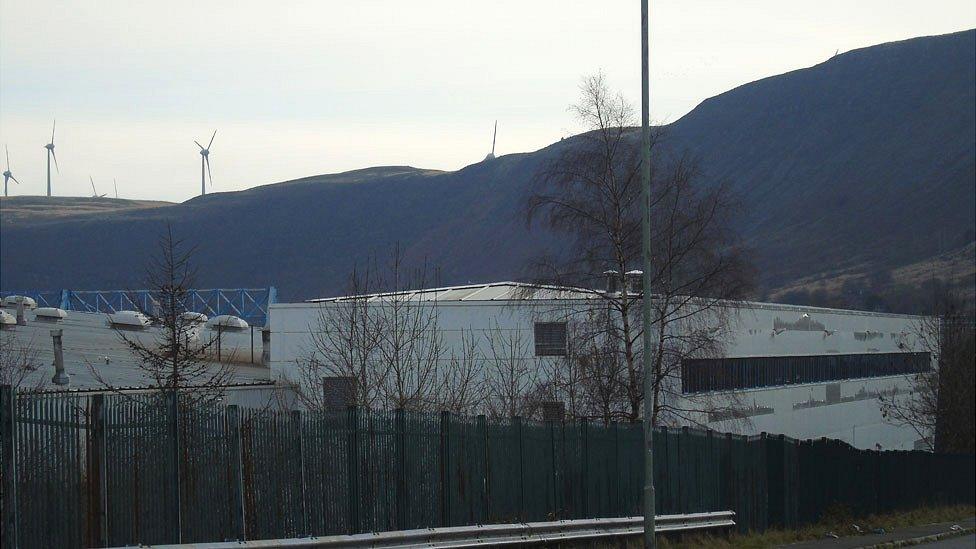
The factory was built on the colliery site in 1996-97
The company's main competitor is in North America and its sales director travels the world to customers in China, India, America and across Europe.
'Spirit'
Mr Harrop, who grew up close to the south Yorkshire coalfield, has lived in the south Wales valleys for 14 years after joining one of the factory's previous owners as technical manager.
"I moved the family down, my son works here and my daughter lives in Aberdare. I'm fully committed. I've put a lot of time and effort in over the last three years to get where we are today."
Now the workforce is up to 150 with 83% living within 12 miles of Maerdy. There's still a union - but the GMB has replaced the NUM at this location.
Literacy, common sense and "giving 150%" are more important than formal qualifications.
"There are some very good people, who are keen, hard working and loyal - 95% of people in this plant," said Mr Harrop.
"There's a spirit within the plant of everyone pulling together. At the moment we're not quite where we've been with orders and I've had to restructure the business a little but 95% are giving 150% to make sure we survive."
If there is any doubt on the progress, he occasionally reminds people of where the factory was 10 years ago.
While a new road would be welcome, Mr Harrop is content with the existing one as long as lorries can get over the mountain in the depths of winter.
It's a tough, lean environment with fine margins; there are no jobs for life any more. But there are hopes Maerdy can continue to push forward globally.
"I say this to the union - I'd love to see realistically 300 people working on this site and us having 50% of the market share on aerosol gaskets or more," said Mr Harrop.
"In injection moulding, I'm already looking at the next technology so we can compete worldwide - we have to be on the front foot."
LOOKING SKYWARDS

The aim is to build on the Dark Sky tourism - here a view of the heavens back towards Mardy from the nearby Brecon Beacons
Hopefully, Maerdy will be able to look to the stars for its future.
Plans for a National Planetarium for Wales are in their early stages, but those behind the Dark Skies project hope to bring tourism, an education centre and around 64 jobs in three years time.
The planetarium - one of Europe's biggest - would be built on reclaimed colliery land at Castell Nos along the old pit road. As well as a 350-seat auditorium, there would be an education centre, with simulators of the Mars rover, and a café.
There would also be a small observatory for sky gazers, taking advantage of the lack of light pollution.
Allan Trow, manager with Dark Sky Wales, says a feasibility study will firm up the plans, which hopes to attract 400,000 visitors a year eventually.
"We want the whole village, the businesses and the shops to benefit from it, from the people coming into the area" he said.
"We'd be recruiting from the local area for many of the jobs."
Maybe it will be that "something" that a number of local people I spoke to have hopes for. A spark that can ignite recovery.
Will that be a better road - whether to commute out or entice more business in?
Could even the south Wales Metro reach the village? "Why can't they start it in Maerdy and work down?" said one resident. At the moment, with no existing rail line, Maerdy and the Rhondda Fach are not even on the outline Metro map for south east Wales.
The Metro in Maerdy would be a statement of ambition, if probably unrealistic. But is there room for some blue-sky thinking among the Dark Skies tourism? Could subsidised or free bus links for those who need them for work be an alternative?
What strengths the village still has - shaped by its mining past - lie from within and even more so after the pit's closure, the great outdoors.
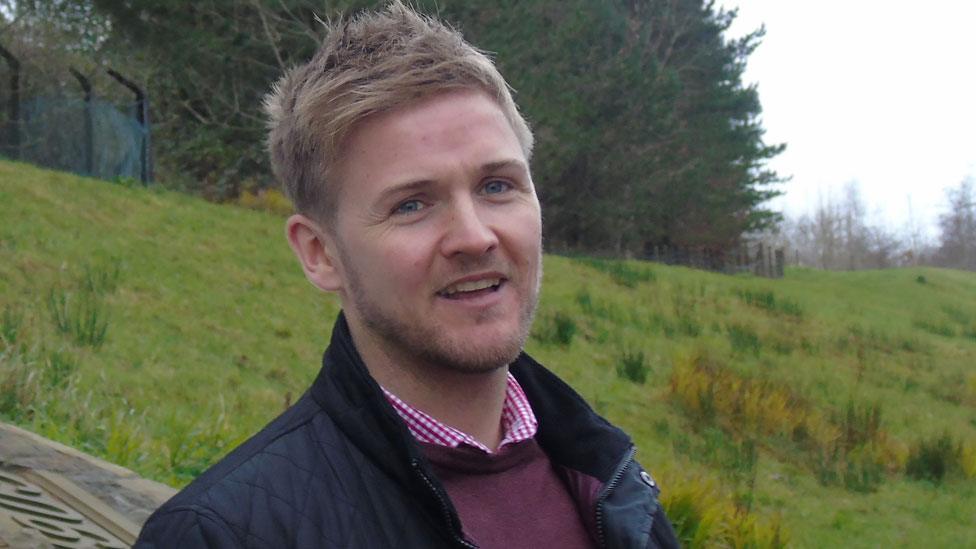
Keiron Montague
Asked what he'd like Maerdy to look like in another 25 years, Keiron Montague said: "I can open my back door and walk my dog straight onto a mountain, visit two reservoirs full of fish and pass 30 or 40 people on their cycles that same day. We should utilise the environment and say this is a fantastic place to live."
"But alongside that we want have a vibrant economy in Maerdy in terms of shops, small business. I think we're getting there now."
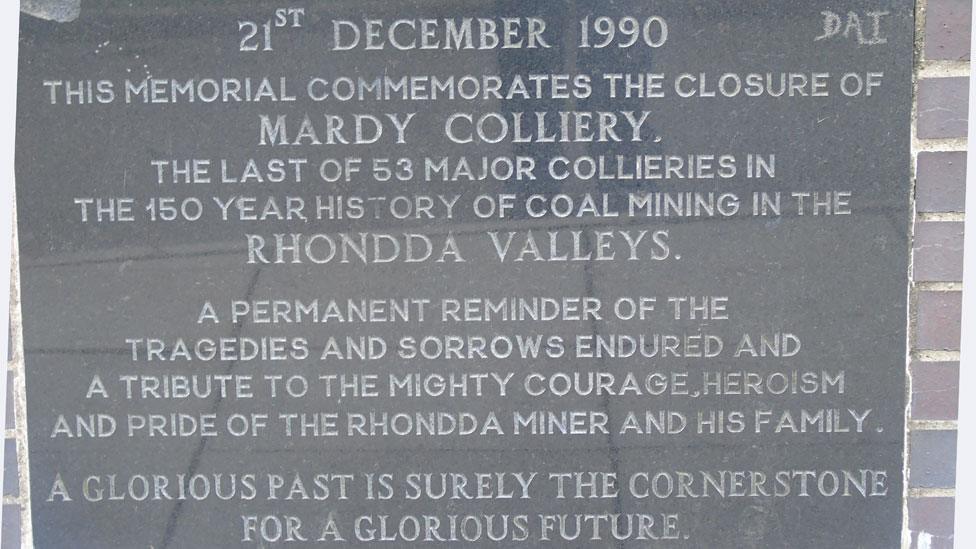
A plaque marking the pit's closure and its part in the Rhondda's mining history
There's a plaque in the park marking the pit's closure. It ends with a challenge and no question mark: "A glorious past is surely the cornerstone for a glorious future."
Mr Montague says: "The community has certain skills and traits it wouldn't have had, if the colliery hadn't happened.
"It's all well and good sitting back and saying we've lost something, but we've so many assets in this community, let's build on that."
- Published23 December 2015

- Published22 December 2015
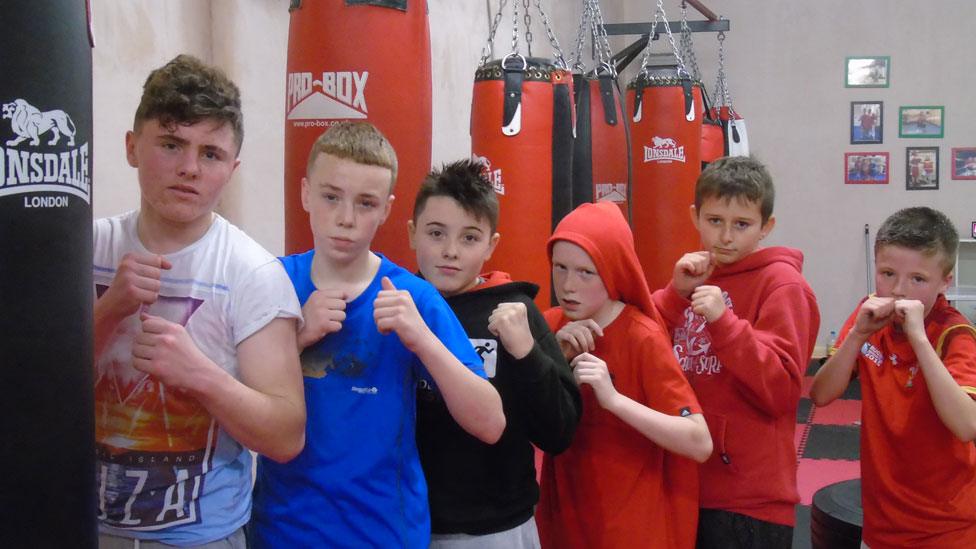
- Published21 December 2015
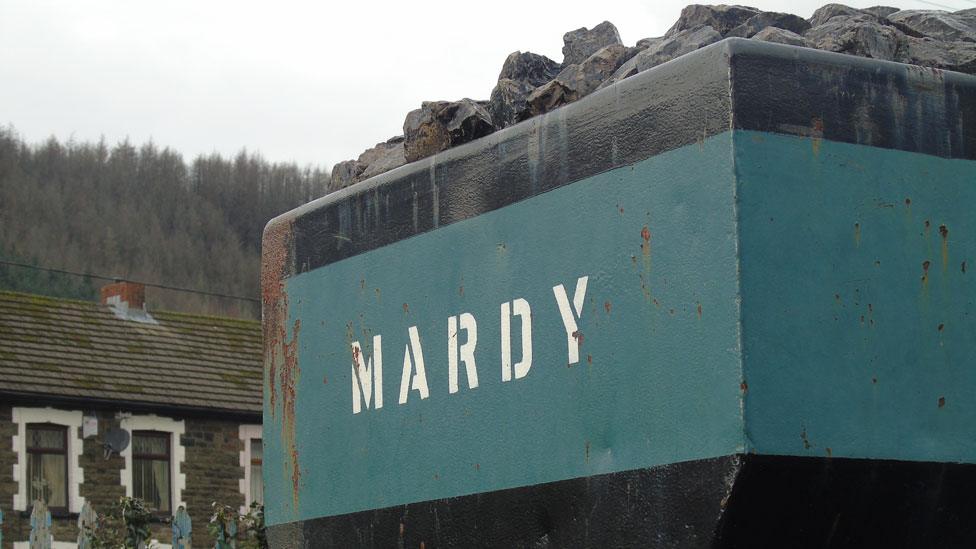
- Published3 January 2011